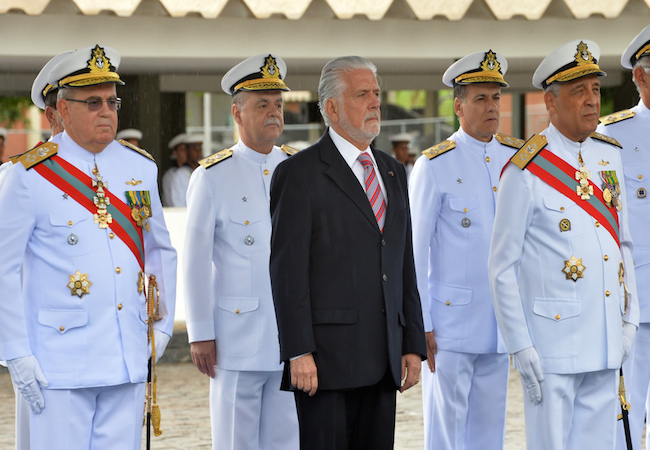
Brazil’s minister of defense Jacques Wagner questioned Argentina’s approach to China regarding military procurement, but discarded any conflict with Buenos Aires, since the country is a ‘strategic and important partner’ of Brazil. Apparently the issue was brought up by Jacques when he visited his counterpart Agustín Rossi in Buenos Aires last week.
“However that was not the main issue of discussion or reason for my trip. I returned from Buenos Aires with assurances that Argentina gives leading priority to its association with Unasur”, said Jacques during a press conference following the opening of the Defense and Security show (LAAD) in Rio do Janeiro.
Jacques Wagner said it was normal for Argentina to negotiate with other countries, and make business not only in defense issues, and underlined “the very high financial capacity” offered by China.
The minister confirmed that China in effect had offered jet fighters to Argentina, (apparently the Chengdu FC-1/F17 ‘Thunder’) since the country needs to replace the wing of French manufactured Mirage soon to be decommissioned, and also revealed that “Buenos Aires did not discard the purchase of the Saab Gripen NG fighter jet” which Brazil is to manufacture in association with Sweden.
This week Saab and Brazil’s aircraft manufacturer Embraer announced that they were discussing to jointly export the Gripen NG jet fighters to be manufactured in Brazil. Sales could begin sometime in 2023 or 2024, and Brazil would be responsible for sales to the Latin American market, although terms are still to be concluded.
This is not the first time the Gripen option for Argentina is mentioned. However since some of the avionics and other components are of British origin, UK could object the sale of the fighter jets, taking into account its precautions regarding Falklands Islands defense.
According to defense sources in Argentina and Brazil the F17 Thunder offered by China and jointly manufactured with Pakistan, has been successfully combat proven and is relatively cheap. However the Chengdu factory also has the J-10B, which is a more sophisticated model ‘capable of challenging UK’s Typhoon’s“ but the cost is overwhelming. If the deal is finally concluded with China, the package would include some 14 to 20 ‘Thunder’ aircraft equipped with missiles.
In related news minister Wagner also revealed that the Brazilian navy’s modernization program, Prosuper that included the purchase of eleven combat and support vessels will be delayed.
”It’s not reasonable to talk about the purchase of warships or other military hardware this year because of the budget cuts being implemented to try and balance government’s numbers”.
However the chief of the Brazilian navy, Admiral Eduardo Barcellar Leal Ferreira said that the bid for the purchase of vessels has ‘not been concluded’ and the process is ‘momentarily paralyzed’.
The Prosuper program includes five ocean patrol vessels with a 1.800 tons displacement; five 6.000 ton escort vessels and a 24.000 ton support vessel, all to be manufactured in Brazilian yards. The seven bidding are ThyssenKrupp (Germany); DSME (Korea); Navantia (Spain), DCNS (France), Damen (Holland), Ficantieri (Italia) and the UK’s BAE.
The Brazilian Air Force will also feel the pinch: Wagner said that because of the current economic situation the 50 EC725 helicopters from Eurocopter will be delivered, but at a slower pace. “It’s not the ideal” to reduce the factory’s activity, but “we hope the order will be completed although at a different timetable”.
The LAAD show is considered the largest in defense and security fields in Latin America, and convenes an estimated 650 official delegations and stands from 71 different countries. The show which is taking place in Rio do Janeiro closes next Friday.




